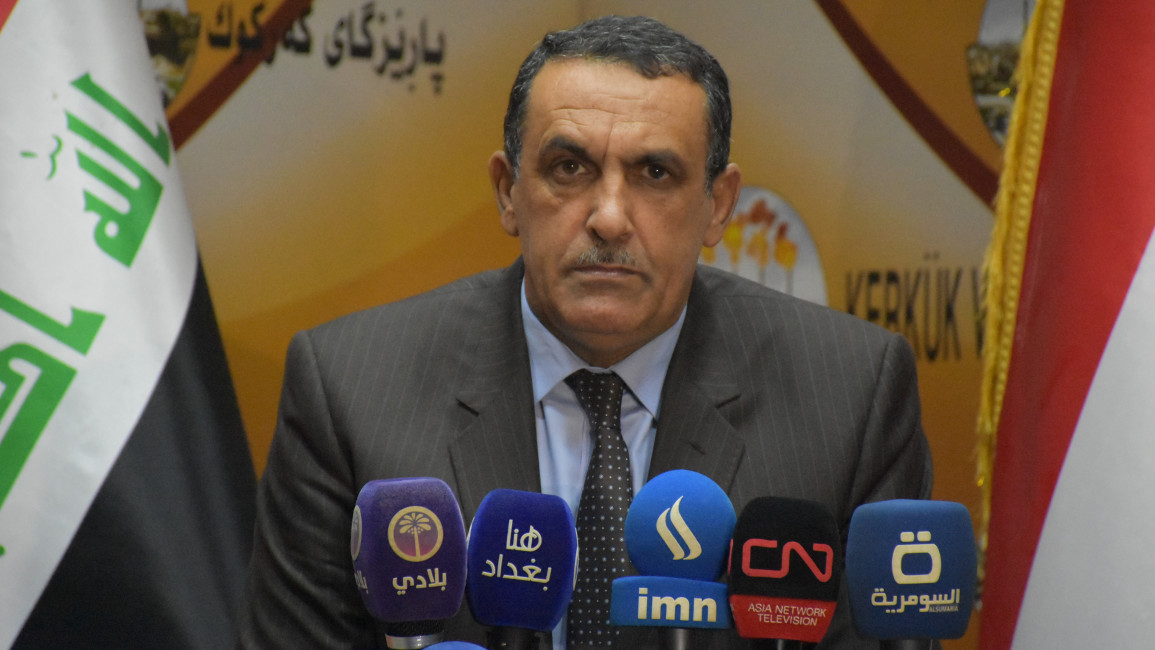Amid poor services and ISIS resurgence, Iraq's political crisis is impeding the election of a new governor for multi-ethnic Kirkuk
An acting governor who has been running Kirkuk since 2017 is expected to stay in his position as political squabbling hampers the election of a new governor for the oil-rich province.
Rakan Saeed al-Jabouri was appointed by the former Iraqi Prime Minister Haider al-Abadi as acting governor of Kirkuk instead of Najmaldin Karim, who was sacked from his position -as an elected governor- by the Iraqi parliament a month earlier.
Kirkuk is a multi-ethnic and oil-rich province in northern Iraq. It is a disputed area between the Iraqi federal government and the Kurdistan Regional Government (KRG). The semi-autonomous Kurdistan region held a failed referendum for independence from Iraq, including Kirkuk city, on 25 September 2017. The move backfired and the Iraqi forces expelled the Kurdish Peshmerga forces from the city a month later.
Karim actively participated in the referendum and raised the Kurdish flag in the disputed city.
Jabouri was elected as an Iraqi lawmaker in the October 10th Iraqi general election, but he has yet to be sworn in. According to the Iraqi constitution, has less than a month to swear in as a member of the Iraqi council of representatives in Baghdad or remain in his position in Kirkuk.
The two main ruling parties in the Kurdistan region, the Kurdistan Democratic Party (KDP) and the Patriotic Union of Kurdistan (PUK) so far have failed to reach a compromise to nominate a candidate to replace Al-Jabouri. They are now locked in a battle to appoint or elect a new governor for Kirkuk.
The process of appointing or electing a new governor, however, is not an easy task as it faces tense political infighting among Kirkuk’s three main nations of the Kurds, the Arabs and the Turkmen. Several constitutional, as well as legal issues, have also been a hindrance.
Iraq, excluding the Kurdistan region, held the last provincial council elections in 2013. Provincial elections have not been held in Kirkuk since 2005, due to different views by the political sides on “an impartial mechanism for establishing a voter registry.”
The PUK sees Kirkuk’s governor as its entitlement on the basis of Kirkuk’s last provincial election. Meanwhile, a KDP spokesperson has recently said the posts of the Iraqi presidency and Kirkuk’s governor are the entitlement of Kurds, indicating his party would settle those issues with its rival, the PUK, via dialogue.
Speaking on condition of anonymity, a well-informed source from the Iraqi ruling elites told The New Arab that al-Jabouri would remain in his position until new provincial elections would be held in Iraq.
The New Arab has repeatedly contacted Amin Baba Sheikh, PUK’s formal spokesperson, and Mahmoud Mohammad, KDP’s formal spokesman, but both were not immediately available to comment. The New Arab also spoke with Stran Abdulla, head of PUK’s Media Bureau, Rawand Mala Mahmoud, head of PUK’s organizational office in Kirkuk, but they declined to comment on the issue.
According to the law for Iraqi provincial councils, the governor should be elected for a period of four years by an absolute majority vote of the provincial council’s members. But the Iraqi Parliament on October, 2019 unanimously voted to suspend provincial councils in Iraq. Dissolving the provincial councils was among the demands of Iraq’s October 2019 anti-corruption protests.
“The decision by the Iraqi parliament to dissolve the provincial councils was an unconstitutional deed because in the decentralized administrative system the national powers of parliament and the council of ministers do not have the power to dissolve the elected provincial councils,” former Iraqi MP and legal expert Latif Sheikh Mustafa told The New Arab.
“But in order for the post would not to become vacant; the Iraqi PM can appoint an acting governor temporarily. The Iraqi law for provincial councils is still in force, thus pursuing different measures other than what has been stipulated in the law for appointing a new governor for Kirkuk is illegal and unconstitutional.”
He said that the only legal solution for the issue is for new provincial elections to be held in Iraq, and then elected members of Kirkuk’s provincial council would elect a new governor.
Meanwhile, Kirkuk’s Turkmen minority say Kirkuk’s governor post should belong to their community, arguing that Kurds and Arabs had run the post since the US-led invasion of Iraq in 2003.
“There is an agreement between the Kurds and the Arabs in Kirkuk, according to which they vowed to appoint a Turkmen governor for Kirkuk if Jabouri goes to Baghdad as an Iraqi lawmaker. The Turkmen governor would hold the position until a new provincial council is elected for Kirkuk,” Arshad Salihi, head of the Turkmen bloc in Iraq's parliament, told The New Arab via WhatsApp messaging service.
While some commended Jabouri for stabilising Kirkuk, a well-informed journalist from Kirkuk, speaking to The New Arab on condition of anonymity, described Jabouri’s performance as “poor”. “Kirkuk’s public services, as well as security conditions, are deteriorating. Currently, there are only four hours of electricity from the national grid, Kirkuk has been drowned with rubbish, and ISIS insurgency is increasing,” the journalist said.
Sheikh Burhan al-Assi, an Arab civilian from Kirkuk and former member of the Arab bloc in the Kirkuk provincial council, echoed the calls for new provincial elections a way out of the crisis.
“Kirkuk’s provincial council was at some extent as the safety valve for the conditions in Kirkuk as it includes representatives of all the sides".



